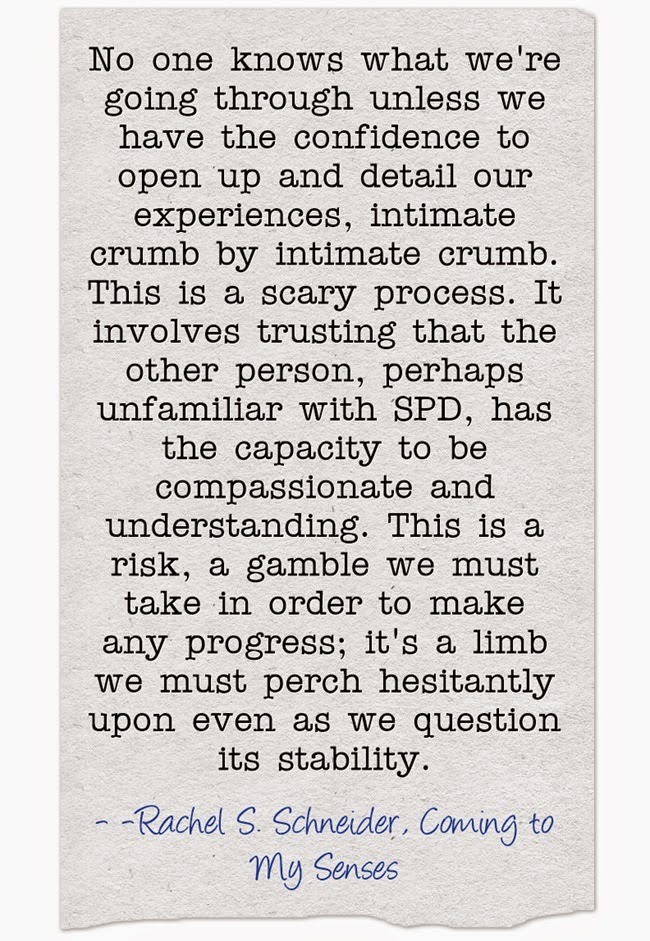In Honor of Year Four
Sometimes the light's all shinin' on me
Other times I can barely see
Lately it occurs to me what a long, strange trip it's been.
-The Grateful Dead
If my Sensory Processing Disorder and I were married, today we'd be exchanging fruit and flowers in celebration of our fourth anniversary. How is that even possible?! It's been a whopping four years since I received my diagnosis of SPD, and four years and two days since this beautiful little blog - nascent and wide-eyed - stumbled into the blogosphere. Back then, it was just the three of us: me, the SPD, and a blank page, and I still can't discuss the history of my diagnosis without the history of Coming to My Senses. They are forever intertwined in my mind.
In my first post on August 16, 2010, I wrote:
I've started this blog to capture this experience as a very self-aware Master's student, from the psychologist's initial diagnosis to occupational therapy and beyond; it's an unexpected plot-twist in my life. My hope is that it can be a companion to those of us adults who are playing catch-up with our sensory-selves, after many years of misdiagnosis, isolation, and confusion.
I knew that reaching others was a stretch at first. I was still two full days away from my official OT diagnosis, and at least a year or two away from any semblance of acceptance. I knew absolutely no one else with SPD, which only heightened how lonely and strange I felt within my new proposed diagnosis, and I was dismayed to find very little information on SPD that appealed to adults. It seemed that I was a misfit, an adult trapped within a child's disorder, and I was destined to wander the desolate diagnosis alone.
It's why I started this blog.
If I was to be an SPD Adult, Party of One, I felt I deserved a companion guide, even if the words I would ultimately turn to for comfort would be mine - a shimmery illusion not unlike a parakeet admiring her own plumes in a tiny mirror, taken aback by her own reflection. And I figured that if someone else stumbled across this blog in the course of their own sensory journey, perhaps it'd comfort them to know that they were in good company.
Even before my diagnosis was official, I knew deep in my gut that someone - anyone - had to begin telling this story. It's what I say to adults with SPD now, and I think it's the most crucial thing that we can do as a somewhat-unrecognized contingent of a hidden disorder: speak up - and not just to one another in the community, but to anyone who will listen. No one knows what we're going through unless we have the confidence to open up and detail our experiences, intimate crumb by intimate crumb. This is a scary process. It involves trusting that the other person, perhaps unfamiliar with SPD, has the capacity to be compassionate and understanding. This is a risk, a gamble we must take in order to make any progress; it's a limb we must perch hesitantly upon even as we question its stability.
Four years later, I look back at my path and the way it has unfurled, and I am incredibly humbled. I can't believe how far I've come, how far this blog has come. What started out as a naive young woman's effort to connect to herself, her sensory issues, and anyone within blog-shot has become a mainstay of the SPD community. Since 2010, I've reached hundreds upon hundreds of SPD adults, SPD parents, and therapists, and shared my journey with them. I've made friends with researchers and authors, and I am honored to call them my mentors. I've taught mental health professionals about SPD and the way in which related psychopathology manifests itself in adulthood when gone untreated, and I've helped spearhead an incredible online support group for my peers. My writing has been featured by major community publications, and my voice has been captured as an expert on this subject.
What I want to say is this: Really? Little old me? Are you sure? Thank you. Thank you to everyone who has believed in me, who has turned to this blog during those tender pre- and post-diagnosis moments and pointed to it as proof, and especially to those who have asked for my support and advice. I've been you and I am still you, and it's an honor to speak on your behalf.
These days, I am no longer the sole explorer meandering the arid steppes of SPD. Amazing blogs written by passionate and clever adult SPDers crop up daily, and I read each one with vigor. I watch with pride as some of the most amazing SPD adults I know take dramatic steps to improve their lives, navigate their limitations, and reframe their thoughts. I am astounded to witness advocacy in action, the ways in which our very words can and do bring attention to our cause.
And yet, I dream of a time decades from now, when our children's grandchildren will connect with their sensory bodies for the first time, a place where we will no longer exist as a sub-group, when there will be no need for our clarion call outward, for a blog like this telling the story of a belated diagnosis and one woman's efforts to catch up. It's a time and a place where every child will receive their proper SPD diagnosis early, undergo extensive treatment, and lead the sorts of unhampered adult lives we can only begin to imagine.
It's why I started this blog.
Even before my diagnosis was official, I knew deep in my gut that someone - anyone - had to begin telling this story. It's what I say to adults with SPD now, and I think it's the most crucial thing that we can do as a somewhat-unrecognized contingent of a hidden disorder: speak up - and not just to one another in the community, but to anyone who will listen. No one knows what we're going through unless we have the confidence to open up and detail our experiences, intimate crumb by intimate crumb. This is a scary process. It involves trusting that the other person, perhaps unfamiliar with SPD, has the capacity to be compassionate and understanding. This is a risk, a gamble we must take in order to make any progress; it's a limb we must perch hesitantly upon even as we question its stability.
Four years later, I look back at my path and the way it has unfurled, and I am incredibly humbled. I can't believe how far I've come, how far this blog has come. What started out as a naive young woman's effort to connect to herself, her sensory issues, and anyone within blog-shot has become a mainstay of the SPD community. Since 2010, I've reached hundreds upon hundreds of SPD adults, SPD parents, and therapists, and shared my journey with them. I've made friends with researchers and authors, and I am honored to call them my mentors. I've taught mental health professionals about SPD and the way in which related psychopathology manifests itself in adulthood when gone untreated, and I've helped spearhead an incredible online support group for my peers. My writing has been featured by major community publications, and my voice has been captured as an expert on this subject.
What I want to say is this: Really? Little old me? Are you sure? Thank you. Thank you to everyone who has believed in me, who has turned to this blog during those tender pre- and post-diagnosis moments and pointed to it as proof, and especially to those who have asked for my support and advice. I've been you and I am still you, and it's an honor to speak on your behalf.
These days, I am no longer the sole explorer meandering the arid steppes of SPD. Amazing blogs written by passionate and clever adult SPDers crop up daily, and I read each one with vigor. I watch with pride as some of the most amazing SPD adults I know take dramatic steps to improve their lives, navigate their limitations, and reframe their thoughts. I am astounded to witness advocacy in action, the ways in which our very words can and do bring attention to our cause.
And yet, I dream of a time decades from now, when our children's grandchildren will connect with their sensory bodies for the first time, a place where we will no longer exist as a sub-group, when there will be no need for our clarion call outward, for a blog like this telling the story of a belated diagnosis and one woman's efforts to catch up. It's a time and a place where every child will receive their proper SPD diagnosis early, undergo extensive treatment, and lead the sorts of unhampered adult lives we can only begin to imagine.




Comments
Post a Comment